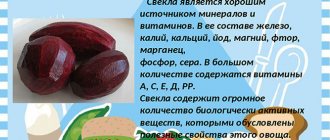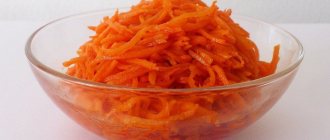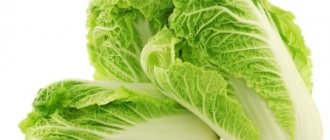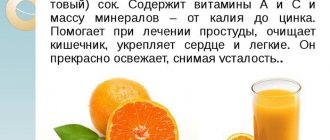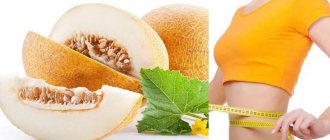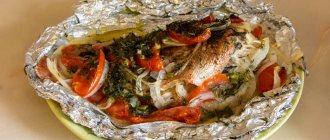Beets are herbaceous plants of the Amaranthaceae family, one of the few vegetables that retain almost all of their beneficial properties when heated. Beets are consumed fresh, fried, boiled and stewed (calorizer). Stewed beets are the healthiest side dish.
Calorie content of stewed beets
The calorie content of stewed beets is 106 kcal per 100 grams of product.
Composition of stewed beets
Useful properties of stewed beets
Stewed beets contain gamma-aminobutyric acid, which plays an important role in brain metabolism. Stewed beets contain a lot of fiber and pectins, which help remove heavy metal salts and breakdown products from the intestines. Stewed beets contain malic, citric, oxalic, tartaric and lactic acids, which play an important role in the digestion of food.
How to cook stewed beets
To prepare stewed beets, you need to rinse the beets under running water, peel them, cut into strips and place in a pan designed for stewing vegetable products. Then add vegetable oil and a little water (calorizator). Mix all ingredients well and simmer slowly under the lid until half cooked, stirring frequently. Then add granulated sugar and salt to taste and continue to simmer until tender, making sure that the beets do not burn.
It is better to stew beets in butter - this gives the dish a unique taste. But it is worth remembering that all additional ingredients change the nutritional and energy benefits of the product.
One can argue forever about the benefits and harms of beets. Any Russian person is familiar with this root vegetable from childhood, the beneficial properties of which were highly valued back in the old days. We are used to seeing it as an obligatory component in such familiar dishes as beetroot soup, vinaigrette, herring under a fur coat, and in restaurants you can find real culinary delights made from beets: marmalade, sorbet, ice cream and many delicious salads.
Composition and calorie content of beets
Beetroot is a vegetable that has a very rich composition. A real “pharmacy” that allows you to improve your health, which includes such substances as:
- Di- and monosaccharides
- Water
- Alimentary fiber
- Starch
- Organic acids that help normalize digestion
- Beta carotene
100 grams of beets contain:
- Proteins – 1.5 grams
- Fat – 0.1 grams
- Carbohydrates – 8.8 grams
As for calorie content, it is important to consider 2 key aspects:
- Raw beets have only 40 kcal calories (per 100 grams, of course).
- If we are talking about boiled vegetables, then the numbers increase slightly - 49 kcal.
In any case, this is a complete dietary product, which also contains many vitamins and beneficial elements (micro-, macro-):
Amount of mg per 100 grams (or mcg)
This is by no means a complete list, although it may seem that the entire periodic table is listed here. In fact, the vegetable contains a complex of amino acids, including:
When cooking the product in beets, does not decrease , the composition does not transform, so the vegetable is useful in any form.
Recipe Stewed beets. Calorie, chemical composition and nutritional value.
Nutritional value and chemical composition of “Stewed beets”.
The table shows the nutritional content (calories, proteins, fats, carbohydrates, vitamins and minerals) per 100 grams of edible portion.
| Nutrient | Quantity | Norm** | % of the norm in 100 g | % of the norm in 100 kcal | 100% normal |
| Calorie content | 59.5 kcal | 1684 kcal | 3.5% | 5.9% | 2830 g |
| Squirrels | 1.4 g | 76 g | 1.8% | 3% | 5429 g |
| Fats | 1.6 g | 56 g | 2.9% | 4.9% | 3500 g |
| Carbohydrates | 9.7 g | 219 g | 4.4% | 7.4% | 2258 g |
| Organic acids | 0.2 g | ~ | |||
| Alimentary fiber | 2.4 g | 20 g | 12% | 20.2% | 833 g |
| Water | 83.1 g | 2273 g | 3.7% | 6.2% | 2735 g |
| Ash | 1.778 g | ~ | |||
| Vitamins | |||||
| Vitamin A, RE | 1.9 mcg | 900 mcg | 0.2% | 0.3% | 47368 g |
| beta carotene | 0.01 mg | 5 mg | 0.2% | 0.3% | 50000 g |
| Vitamin B1, thiamine | 0.019 mg | 1.5 mg | 1.3% | 2.2% | 7895 g |
| Vitamin B2, riboflavin | 0.039 mg | 1.8 mg | 2.2% | 3.7% | 4615 g |
| Vitamin B4, choline | 5.8 mg | 500 mg | 1.2% | 2% | 8621 g |
| Vitamin B5, pantothenic | 0.116 mg | 5 mg | 2.3% | 3.9% | 4310 g |
| Vitamin B6, pyridoxine | 0.068 mg | 2 mg | 3.4% | 5.7% | 2941 g |
| Vitamin B9, folates | 12.556 mcg | 400 mcg | 3.1% | 5.2% | 3186 g |
| Vitamin C, ascorbic acid | 9.66 mg | 90 mg | 10.7% | 18% | 932 g |
| Vitamin E, alpha tocopherol, TE | 0.776 mg | 15 mg | 5.2% | 8.7% | 1933 |
| Vitamin H, biotin | 0.193 mcg | 50 mcg | 0.4% | 0.7% | 25907 g |
| Vitamin K, phylloquinone | 0.3 mcg | 120 mcg | 0.3% | 0.5% | 40000 g |
| Vitamin RR, NE | 0.3863 mg | 20 mg | 1.9% | 3.2% | 5177 g |
| Niacin | 0.193 mg | ~ | |||
| Macronutrients | |||||
| Potassium, K | 278.28 mg | 2500 mg | 11.1% | 18.7% | 898 g |
| Calcium, Ca | 38.77 mg | 1000 mg | 3.9% | 6.6% | 2579 g |
| Silicon, Si | 76.302 mg | 30 mg | 254.3% | 427.4% | 39 g |
| Magnesium, Mg | 21.43 mg | 400 mg | 5.4% | 9.1% | 1867 |
| Sodium, Na | 359.16 mg | 1300 mg | 27.6% | 46.4% | 362 g |
| Sera, S | 8.22 mg | 1000 mg | 0.8% | 1.3% | 12165 g |
| Phosphorus, P | 42.2 mg | 800 mg | 5.3% | 8.9% | 1896 |
| Chlorine, Cl | 526.82 mg | 2300 mg | 22.9% | 38.5% | 437 g |
| Microelements | |||||
| Aluminium, Al | 26 mcg | ~ | |||
| Bor, B | 270.4 mcg | ~ | |||
| Vanadium, V | 67.61 mcg | ~ | |||
| Iron, Fe | 1.379 mg | 18 mg | 7.7% | 12.9% | 1305 g |
| Yod, I | 6.76 mcg | 150 mcg | 4.5% | 7.6% | 2219 g |
| Cobalt, Co | 2.054 mcg | 10 mcg | 20.5% | 34.5% | 487 g |
| Lithium, Li | 57.951 mcg | ~ | |||
| Manganese, Mn | 0.6395 mg | 2 mg | 32% | 53.8% | 313 g |
| Copper, Cu | 137.42 mcg | 1000 mcg | 13.7% | 23% | 728 g |
| Molybdenum, Mo | 10.553 mcg | 70 mcg | 15.1% | 25.4% | 663 g |
| Nickel, Ni | 13.522 mcg | ~ | |||
| Rubidium, Rb | 437.5 mcg | ~ | |||
| Selenium, Se | 0.677 mcg | 55 mcg | 1.2% | 2% | 8124 g |
| Strontium, Sr | 8.11 mcg | ~ | |||
| Fluorine, F | 19.33 mcg | 4000 mcg | 0.5% | 0.8% | 20693 g |
| Chromium, Cr | 19.32 mcg | 50 mcg | 38.6% | 64.9% | 259 g |
| Zinc, Zn | 0.4154 mg | 12 mg | 3.5% | 5.9% | 2889 g |
| Zirconium, Zr | 0.08 mcg | ~ | |||
| Digestible carbohydrates | |||||
| Starch and dextrins | 0.097 g | ~ | |||
| Mono- and disaccharides (sugars) | 9.6 g | max 100 g | |||
| Glucose (dextrose) | 0.29 g | ~ | |||
| Sucrose | 8.306 g | ~ | |||
| Fructose | 0.097 g | ~ | |||
| Essential amino acids | 0.396 g | ~ | |||
| Arginine* | 0.07 g | ~ | |||
| Valin | 0.051 g | ~ | |||
| Histidine* | 0.013 g | ~ | |||
| Isoleucine | 0.058 g | ~ | |||
| Leucine | 0.065 g | ~ | |||
| Lysine | 0.089 g | ~ | |||
| Methionine | 0.019 g | ~ | |||
| Methionine + Cysteine | 0.039 g | ~ | |||
| Threonine | 0.051 g | ~ | |||
| Tryptophan | 0.013 g | ~ | |||
| Phenylalanine | 0.043 g | ~ | |||
| Phenylalanine+Tyrosine | 0.097 g | ~ | |||
| Nonessential amino acids | 0.91 g | ~ | |||
| Alanin | 0.039 g | ~ | |||
| Aspartic acid | 0.317 g | ~ | |||
| Glycine | 0.037 g | ~ | |||
| Glutamic acid | 0.265 g | ~ | |||
| Proline | 0.045 g | ~ | |||
| Serin | 0.061 g | ~ | |||
| Tyrosine | 0.048 g | ~ | |||
| Cysteine | 0.014 g | ~ | |||
| Sterols (sterols) | |||||
| beta sitosterol | 3.089 mg | ~ | |||
| Saturated fatty acids | |||||
| Saturated fatty acids | 0.2 g | max 18.7 g | |||
| 16:0 Palmitinaya | 0.096 g | ~ | |||
| 18:0 Stearic | 0.063 g | ~ | |||
| 20:0 Arakhinovaya | 0.005 g | ~ | |||
| 22:0 Begenovaya | 0.011 g | ~ | |||
| Monounsaturated fatty acids | 0.368 g | min 16.8 g | 2.2% | 3.7% | |
| 18:1 Oleic (omega-9) | 0.366 g | ~ | |||
| Polyunsaturated fatty acids | 1.004 g | from 11.2 to 20.6 g | 9% | 15.1% | |
| 18:2 Linolevaya | 0.924 g | ~ | |||
| Omega-6 fatty acids | 1 g | from 4.7 to 16.8 g | 21.3% | 35.8% |
The energy value of stewed beets is 59.5 kcal.
Primary Source: Created in the application by the user. Read more.
** This table shows the average levels of vitamins and minerals for an adult. If you want to know the norms taking into account your gender, age and other factors, then use the “My Healthy Diet” application.
Benefits of beets for the human body (fruits, juice, tops)
Of course, the benefits of beets in dishes are somewhat reduced, so for health and medicinal purposes it is better to eat raw or boiled, make freshly squeezed juice or decoction from it, and also use beet tops for food.
Why buy a dozen expensive medicines at the pharmacy, if an excellent healing remedy grows in almost every garden and lies in abundance on store shelves! Considering the numerous medicinal properties of beets, you should definitely make room for them in your garden and add this wonderful root vegetable to your diet more often.
The medicinal properties of red beets were recognized by Hippocrates. This root vegetable was used to heal skin inflammations and infectious diseases, and Dr. Paracelsus successfully treated various blood diseases with beets, including iron deficiency anemia.
There are not as many vitamins in beets as in carrots or bell peppers, but beet leaves are a good source of vitamin A, while root vegetables contain sufficient amounts of vitamin B9, thanks to which beets are very useful for the prevention of heart disease. There are even separate varieties of Swiss chard (for example, Chard or some fodder varieties). And in terms of the presence of iodine, iron and zinc, the root vegetable is significantly superior to other vegetables, being the best natural medicine for problems with hematopoiesis, dysfunction of the gonads and metabolism.
Beet leaves are a good source of vitamin A
A rich chemical composition, including amino acids, organic acids, bioflavonoids, pectins, glucose, fructose, minerals and trace elements, provides the unique properties of beets.
Beets are useful because:
- prevents anemia and promotes hemoglobin production;
- helps create new cells in the body, providing a rejuvenating effect;
- improves digestion and intestinal motility;
- improves metabolism and, therefore, helps with smooth weight loss;
- eliminates toxins;
- reduces the risk of occurrence and reduces the growth of malignant tumors;
- cleanses blood vessels;
- helps in the treatment of hypertension and atherosclerosis;
- in men it stimulates sexual activity;
- relieves premenstrual pain for women;
- has a laxative and diuretic effect;
- has an anti-inflammatory effect;
- relieves pain and promotes recovery;
- helps cope with depression;
- increases the body's endurance;
- helps preserve vision health;
- indispensable for thyroid diseases due to the record amount of iodine.
Raw or cooked?
There are adherents of eating only boiled vegetables; some believe that raw beets cannot be better. We suggest you figure out who can and cannot use both options, what objective advantages exist in the chosen form of use.
Boiled vegetable
It is no secret that most vegetables tend to lose their beneficial qualities during heat treatment. Beets are a pleasant exception to the rule. Even boiled, it perfectly retains all minerals and vitamins. The only transformation that occurs with it is a slight increase in calorie content.
Since beets contain enough iron, it helps to quickly restore blood loss and effectively fight diseases such as anemia. That is why women are recommended to regularly consume beets during menstrual bleeding, including boiled ones. The presence of boron in the composition promotes the production of hormones. This list can be continued for a long time, since the beneficial properties of a vegetable after cooking will not differ in any way from the properties of a raw one.
As for the prohibitions. There are some nuances here. If you overuse boiled beets, you may end up with a problem such as a decrease in the natural level of calcium absorption by the body. In this regard, it is not recommended to consume boiled beets for people with a deficiency of this substance. Otherwise, the list of contraindications is 100% similar to the prohibitions for raw vegetables (you will learn about them below).
Fresh vegetable
It's rare to find skeptics about eating raw beets. Since childhood, we have been familiar with salads, which, among other things, contain this vegetable. This is not surprising, considering what objective health benefits exist if you decide to eat beets raw:
- Anti-inflammatory properties, both externally and internally.
- A natural antioxidant that removes accumulated toxins, salts and cholesterol from the body, while protecting against negative radioactive effects.
- Beneficial effect on the gastrointestinal tract.
- Improving the activity of the cardiovascular system.
- Restoration and renewal of liver cells.
- Strengthens bones and prevents osteoporosis when consumed wisely.
- Comprehensive strengthening of the immune system.
- Improved vision.
- Increasing energy reserves and performance is a natural “doping”.
- Excellent prevention of prostate adenoma.
Raw or cooked
The root vegetable of this vegetable is used as food, which contains a low percentage of calories. 100 grams of raw beets contain 45 kcal. At the same time, it contains very little fat, but a sufficient amount of carbohydrates. The root vegetable can be used not only in salads, first and main courses, but is a good basis for sweet dishes.
Raw beets contain a lot of useful substances. With regular use, this vegetable can improve metabolism. After all, it is rich in fiber, which is effective in removing toxins. Also, the high presence of vitamin B9 makes it an indispensable product for people suffering from cardiovascular diseases.
100 g of this vegetable contains:
- 85 g water;
- 1.6 g protein;
- 11.6 g carbohydrates;
- 0.2 g fat.
Boiled beets are very often used as ingredients for salads. This vegetable can be eaten simply with garlic, seasoned with olive oil, and without worrying about gaining excess weight. The calorie content of boiled beets is also not high, only 50 kcal per 100 grams of vegetable.
Boiled beets can bring greater benefits to the body than raw ones. If you do not cut off the edges during cooking, the vegetable will retain all its beneficial substances in full. Therefore, you can use this product with complete confidence, which will benefit not only your figure, but the entire body.
The benefits of beets during pregnancy and breastfeeding
Women preparing to become mothers, as well as those who practice breastfeeding, should pay attention to beets and be sure to eat them. As already noted, this vegetable contains many vitamins and other useful components that the body needs in such a state:
- Folic acid is indispensable for preventing malformations of the baby in the womb. It helps the child’s central nervous system develop normally.
- Thanks to iron, you can forget about its deficiency, which many pregnant women face. Plus, the element helps prevent oxygen starvation of the fetus, as it saturates the blood with oxygen.
- No one will argue that iodine is extremely important during pregnancy and lactation, and it is also found in beets. This is especially important for those women who have problems with the thyroid gland.
- Practice shows that with high blood pressure, beets can act as “pills” to lower these indicators.
However, those mothers who are prone to stomach upsets or suffer from diabetes should treat beets with caution.
Beetroot salad with prunes: calorie content per 100 grams, nutritional value
Calorie content of beets with prunes per 100 grams is 132.5 kcal. 100 g of the dish (150 g of boiled beets, 50 g of prunes and 5 ml of sunflower oil were used for preparation) contains:
- proteins – 1.5 g;
- fats – 5 g;
- carbohydrates – 19 g.
The composition of 100 g of beets with prunes and oil includes the following set of vitamins and minerals (in brackets, % of substances from the daily value of an adult):
- B1 (1.6);
- B2 (2.8);
- B4 (1.4);
- B5 (4);
- B6 (4.8);
- B9 (14);
- C (3.6);
- E (17);
- K (12);
- PP (3,1);
- potassium (17);
- calcium (3);
- silicon (15);
- magnesium (10);
- sodium (4.3);
- phosphorus (5.8);
- iron (13);
- cobalt (9.3);
- manganese (15);
- copper (12);
- molybdenum (3.2);
- selenium (1);
- chromium (5.3);
- zinc (2.9).
The benefits of beets for weight loss
Beetroot is often found as a base ingredient in mono-diets for a couple of days. This is not surprising, given the composition of the vegetable. In terms of weight loss, the following elements are especially important:
- Iodine
- Iron
- Potassium
Among the main advantages of introducing beets into the diet of a person losing weight:
- Thanks to betaine, protein is better absorbed in the body when it comes with food.
- Taking beets before meals can significantly reduce the feeling of hunger and get you quickly full.
- Since beets contain enough fiber, they increase in volume in the stomach without being digested, giving signals about the absence of hunger.
- Acceleration of metabolism.
- Removal of toxins and other harmful substances.
- Both raw beets and cooked beets help fight fat accumulation (curcumin is responsible for this) while following the basics of nutritional supplements.
THIS IS INTERESTING: nutritionists believe that it is better, when on a diet, to give preference to raw vegetables, since boiled vegetables have a higher glycemic index, plus increased calorie content.
Raw beets: calorie content per 100 grams, nutritional value, vitamins, minerals
The calorie content of raw beets per 100 grams is 42.1 kcal. 100 g of fresh vegetable contains:
- proteins – 1.6 g;
- fats – 0.2 g;
- carbohydrates – 9.4 g.
Read: Borscht: benefits and harms
The composition of 100 g of raw beets includes the following set of vitamins and minerals (in brackets, % of substances from the daily value of an adult):
- AT 12);
- B2 (2,2);
- B4 (1,2);
- B5 (3);
- B6 (3.3);
- B9 (27);
- C (5.3);
- PP (1.6);
- potassium (13);
- calcium (1.6);
- magnesium (5.6);
- sodium (5.9);
- phosphorus (4.9);
- iron (7.8);
- manganese (16);
- copper (7.4);
- selenium (1);
- zinc (2.9).
The benefits of beets for pancreatitis and other gastrointestinal diseases
We have already listed the positive qualities of beets and their effect on the body. Naturally, this also affects the sphere of activity of the gastrointestinal tract. People suffering from pancreatitis and other gastrointestinal diseases can count on the help of beets, as they:
- Prevents the development of pathogenic bacteria and microbes in the body.
- Removing toxins from the intestines.
- Using the root vegetable, you can prepare a composition to get rid of Giardia.
- Beets are indispensable for relieving constipation.
- Regular consumption of vegetables allows the complex to improve the functioning of the digestive organs.
Beetroot baked in the oven in foil: calorie content per 100 grams, bju
The calorie content of beets baked in the oven in foil per 100 grams is 44.3 kcal. 100 g of dish contains:
- proteins – 1.6 g;
- fats – 0.1 g;
- carbohydrates – 9.2 g.
The composition of 100 g of baked beets includes the following set of vitamins and minerals (in brackets, % of substances from the daily value of an adult):
- B1 (1,2);
- B2 (2);
- B4 (1.3);
- B5 (2.2);
- B6 (3.2);
- B9 (1.9);
- C (5.4);
- PP (1.9);
- potassium (12);
- calcium (4.4);
- magnesium (5.8);
- sodium (3.8);
- phosphorus (5.5);
- chlorine (2);
- iron (15);
- manganese (35);
- copper (15);
- molybdenum (15);
- selenium (1,1);
- zinc (3.9).
Contraindications and potential harm for women and men
It would be wrong to say that the vegetable is harmful to health. In fact, the harm of beets can only manifest itself if you thoughtlessly consume them in large quantities in the presence of certain health problems.
Beets interfere with calcium absorption
So, you should not get carried away with either raw or boiled beets if you have gastritis with high acidity, since this root vegetable can further increase the acidity of the stomach. For diabetes mellitus, it is also advisable to limit the consumption of vegetables, because they contain a considerable amount of sugars. And if red beets are beneficial for chronic constipation, then for chronic diarrhea it is definitely not worth eating, so as not to aggravate the situation, especially in old age.
It is not advisable to drink fresh root juice if you have gout, rheumatoid arthritis, intestinal disorders and low blood pressure.
Beetroot is completely contraindicated for urolithiasis due to its oxalic acid content. Despite the folk recipes found on the Internet for treating bladder and kidney stones with beetroot juice, this is strictly not recommended!
The amazing medicinal properties of beets are preserved even after long-term winter storage.
Where there are more beneficial properties: raw, boiled, baked, steamed, fried or in fresh juice
The most beneficial properties of beets are manifested in freshly squeezed juice. All vitamins and minerals in root juice are contained in concentrated form. This juice is useful for severe fatigue, vitamin deficiency, lack of hemoglobin, constipation, as well as for the purpose of general cleansing of the body and removal of toxins. Drinking fresh beet juice at the first sign of a cold helps the body immediately cope with the disease.
But pure beet juice is too rich, so it is usually mixed with carrot juice in a ratio of 1 to 10, over time increasing the amount of beet juice to half a glass. When preparing vegetable juice, first squeeze the beet roots so that the juice settles a little, and only after a couple of hours squeeze the carrots. In case of hypertension, it is better to drink beet juice with a diluted spoon of honey.
You can also use the juice squeezed from beet roots to treat a runny nose: in this case, the slightly fermented juice is instilled into each nostril three times a day, two or three drops.
The most beneficial properties of beets are manifested in freshly squeezed juice.
Other uses for beets:
- The healthiest thing is raw beets, but they should be eaten in small portions, otherwise problems with the gastrointestinal tract may occur. You can reduce the active effect of a raw vegetable if you grate it and let it stand for a while or mix it with other vegetables in a salad;
- boiled, baked and stewed root vegetables are recommended for constipation, digestive disorders, gallbladder and liver diseases; boiled beets can also be eaten by patients with diabetes mellitus;
- dishes with beets help in the treatment of atherosclerosis and obesity; fruits baked in the oven are especially tasty (sometimes they are made in the microwave, which is less healthy, but comes out faster than with the oven);
- Pickled and pickled beets have long been used as the best remedy for scurvy;
- It is very useful to add beet tops to salads, soups, casseroles or soak dried ones in wine vinegar - in the fall, beet greens contain more vitamins, minerals and protein than root vegetables. Healthy kvass is often made from the leaves;
- for constipation, grated boiled beets are seasoned with olive oil and used as a mild laxative at night;
- A paste of raw fruit is applied externally to ulcers and cracks, changing the compress as it dries. Masks with the addition of vegetables have a beneficial effect on the skin with teenage acne.
Korean-style beets will be a pleasant snack for lovers of spicy foods, as will the grated fruit in combination with horseradish. However, remember that there are very few health benefits in such products!
Boiled beets with vegetable oil and garlic: calorie content per 100 grams, bju
Calorie content of boiled beets with vegetable oil and garlic per 100 grams is 86.4 kcal. 100 g of the dish (100 g of boiled beets, 5 ml of sunflower oil, 1 small clove of garlic, 1 g of salt were used for preparation) contains:
- proteins – 1.6 g;
- fats – 5 g;
- carbohydrates – 7.8 g.
Read: Why you want salted fish: reasons
The composition of 100 g of boiled beets with oil and garlic includes the following set of vitamins and minerals (in brackets, % of substances from the daily value of an adult):
- B1 (1.8);
- B2 (2,2);
- B4 (1,2);
- B5 (2.8);
- B6 (3.3);
- B9 (19);
- C (3.9);
- E (15);
- PP (1.6);
- potassium (12);
- calcium (1.6);
- magnesium (5.6);
- sodium (21);
- phosphorus (4.6);
- iron (7.7);
- manganese (16);
- copper (7.2);
- selenium (1);
- zinc (2.8).
What to combine root vegetables with in salads and other dishes
The most popular and useful combinations can be:
- juice of beets, apples and carrots (taken in the morning on an empty stomach);
- root vegetable with sour cream and garlic (there are options with mayonnaise, but this product is clearly not healthy);
- salad with root vegetables, nuts and prunes - a real delicacy and good for the intestines;
The amazing medicinal properties of beets are preserved even during long-term winter storage. This means that in spring, when the body experiences a particular lack of vitamins and beneficial microelements, root vegetables can become a real life-saver for improving health! Therefore, the question of what is more beneficial or harmful in beets is now much easier to answer.
Useful recipes to note
If you study traditional medicine recipes, you can find many options that include sugar beets, as well as those where it acts as the main ingredient. Here are some very simple and effective recipes for different life situations.
- Hypertensive patients can mix ¼ of freshly squeezed beetroot juice with a teaspoon of flower honey and drink before meals to reduce blood pressure.
- Got a runny nose? No problem! Wait for the beet juice to sour, and then drop it into the nasal passages 3 times a day, 2 drops.
- For scurvy, it is recommended to cook and eat pickled beets. You can prepare it according to the traditional recipe.
- You can also treat ulcers by enlisting the help of the described vegetable. Grate the beets to make a paste and apply to the affected areas of the skin.
- Wait for the mixture to dry and change the bandage. This recipe, by the way, is also good for acne in adolescence.
Composition of beets. Beet calories
Carbohydrates - 14% of the composition: glucose, fructose, sucrose (the latter 6%), pectins. Vitamins, minerals, trace elements : B, BB, C (a little), carotenoids, folic and pantothenic acids, potassium, iron, magnesium, manganese, iodine, cobalt, copper, zinc, phosphorus, sulfur, cesium, rubidium, chlorine, etc. - the whole periodic table, and in significant quantities!
Organic acids : citric, oxalic, malic.
Amino acids : betaine, betanin, lysine, valine, arginine, histidine, etc.
Fiber - a large amount.
Calorie content of beets (in 100 grams) : Calories, kcal: 40 Proteins, g: 1.5 Fats, g: 0.1 Carbohydrates, g: 8.8
Stewed root vegetable
As mentioned above, boiled beets do not lose their beneficial substances. The same thing happens when stewing vegetables. This is probably the most unique product that does not lose its benefits in any preparation.
Stewed beets, in addition to the necessary microelements, also contain gamma-aminobutyric acid. It actively affects the metabolism that occurs directly in the head. Also, stewed food produces acids: malic, citric, oxalic, tartaric and lactic. All these acids are very important for the digestive process.
Stewed beets will have a unique taste if butter is used during cooking. It is worth remembering that by adding extraneous foods, the calorie content will change.
The calorie content of stewed beets will be 106 kcal per 100 grams. This dish will be useful not only for people losing weight, but also for those who do not eat fatty foods and watch their diet. Stewed food is filling, healthy and tasty.
What are the benefits of beets? Medicinal properties of beets
The beneficial properties of beets are due to its biochemical composition.
Beets are useful for chronic constipation. Thanks to fiber, organic acids and other elements, it regulates metabolic processes and enhances intestinal motility. Beetroot is the body’s No. 1 “cleaner”; it sanitizes the intestines, including through the destruction of putrefactive bacteria, and not just the mechanical effect of fiber.
Beets are useful because they contain the lipotropic substance betaine, which regulates fat metabolism, prevents liver infiltration and increased blood pressure. Beet betaine performs its function equally in freshly squeezed juice and in hot borscht. Used for obesity and liver diseases.
Magnesium, found in abundance in beets, helps treat atherosclerosis and hypertension.
Beets have a diuretic and laxative effect. It relieves pain, has an anti-inflammatory effect, promotes recovery, helps the body fight depression and is an excellent hangover cure when used in meat borscht.
Beets are good for healthy blood formation. It contains microelements responsible for these processes. People whose diet includes beets rarely suffer from anemia.
Beets are essential for pregnant women. Folic acid, which is included in its composition, is vital at the planning stage of a child and at the beginning of pregnancy, since without it a healthy nervous system of the little one will not form. In addition, constipation is common in this state, and beets come in handy.
As for the high iodine content among root vegetables, its presence makes beets especially useful for iodine deficiency diseases of the thyroid gland and for elderly people suffering from atherosclerosis.
There is an assumption that betanin inhibits the development of malignant tumors, and the fact that beets are a powerful energy source has been confirmed by many years of research.
In addition, beets are a low-calorie product. This is related to the popularity and effectiveness of beetroot diets for weight loss.
Benefits of beets
The main benefits of beets are as follows:
- thanks to the aminobutyric acids contained in the vegetable, beets are useful for normalizing brain function;
- pectins and fiber in the product ensure cleansing of the intestines from toxins and heavy metal salts;
Interesting: Calorie content of roasted peanuts
- The beneficial property of beets to speed up metabolism is known;
- the vegetable is considered an effective means of preventing constipation;
- With regular consumption of beets, blood pressure normalizes;
- the benefits of beets as a laxative and diuretic, as well as for the prevention of hypertension, have been confirmed;
- The microelements contained in beets help normalize the process of hematopoiesis;
- folic acid in the product is necessary for pregnant women to form a healthy nervous system of the fetus;
- the vegetable is useful for thyroid diseases;
- The low calorie content of fresh, stewed and boiled beets per 100 grams makes the vegetable an essential element of the most popular diets.
Harm of beets
It is probably more correct to prepare not about the dangers of beets, but about the limitations in its use. They are also determined by the chemical composition of beets.
Osteoporosis, predisposition to it . This is due to the fact that beets interfere with the absorption of calcium.
Diabetes . Because it is a sweet vegetable, with a fairly high sugar content.
Urolithiasis (oxaluria primarily). Beets are contraindicated in this case because they contain oxalic acid. On the Internet you can find many folk recipes on the topic of treating kidney and bladder stones with beet juice. This should not be done under any circumstances!
Chronic diarrhea . Beets have a pronounced laxative effect.
Pickled beets: calorie content per 100 grams, bju
The calorie content of pickled beets per 100 grams is 30 kcal (using the example of Conservatory of Taste products). 100 g of product contains:
- proteins – 0.7 g;
- fats – 0 g;
- carbohydrates – 8 g.
Read: Boiled buckwheat: calorie content
The composition of such pickled beets includes beets, sugar, table salt, spices, and acetic acid.
Beetroot in folk medicine
Recipes for treating beets can be collected in at least one thick volume. Below are some of the most popular and tested ones.
For hypertension. Mix freshly squeezed beet juice with a teaspoon of honey. Drink a quarter glass before meals. Beet kvass is very good for these purposes; it is quite simple to prepare.
For constipation, beets should become a favorite product for a long time, both in the form of all kinds of dishes, and in the form of decoction and juice. For persistent constipation, the decoction is prescribed in enemas.
Beets are included in many dietary dishes prescribed for the treatment of tuberculosis.
For a runny nose, beetroot juice (preferably sour, fermented) is dropped into the nose, 2-3 drops 3 times a day.
In folk medicine, beets are also used externally. When treating ulcers, cracks, for example, a paste of it is applied to the affected areas. As it dries, change the bandage and repeat. The root vegetable also helps with teenage acne in the form of beet masks.
We seem to have defeated scurvy, and yet it still occurs. The best healing food for scurvy is pickled beets. For information on how to prepare pickled beets, see the recipe for Ukrainian borscht.
Freshly squeezed beet juice occupies a special place in dietary nutrition as a highly effective means - the benefits of beets in it (and contraindications at the same time) appear in concentrated form.
